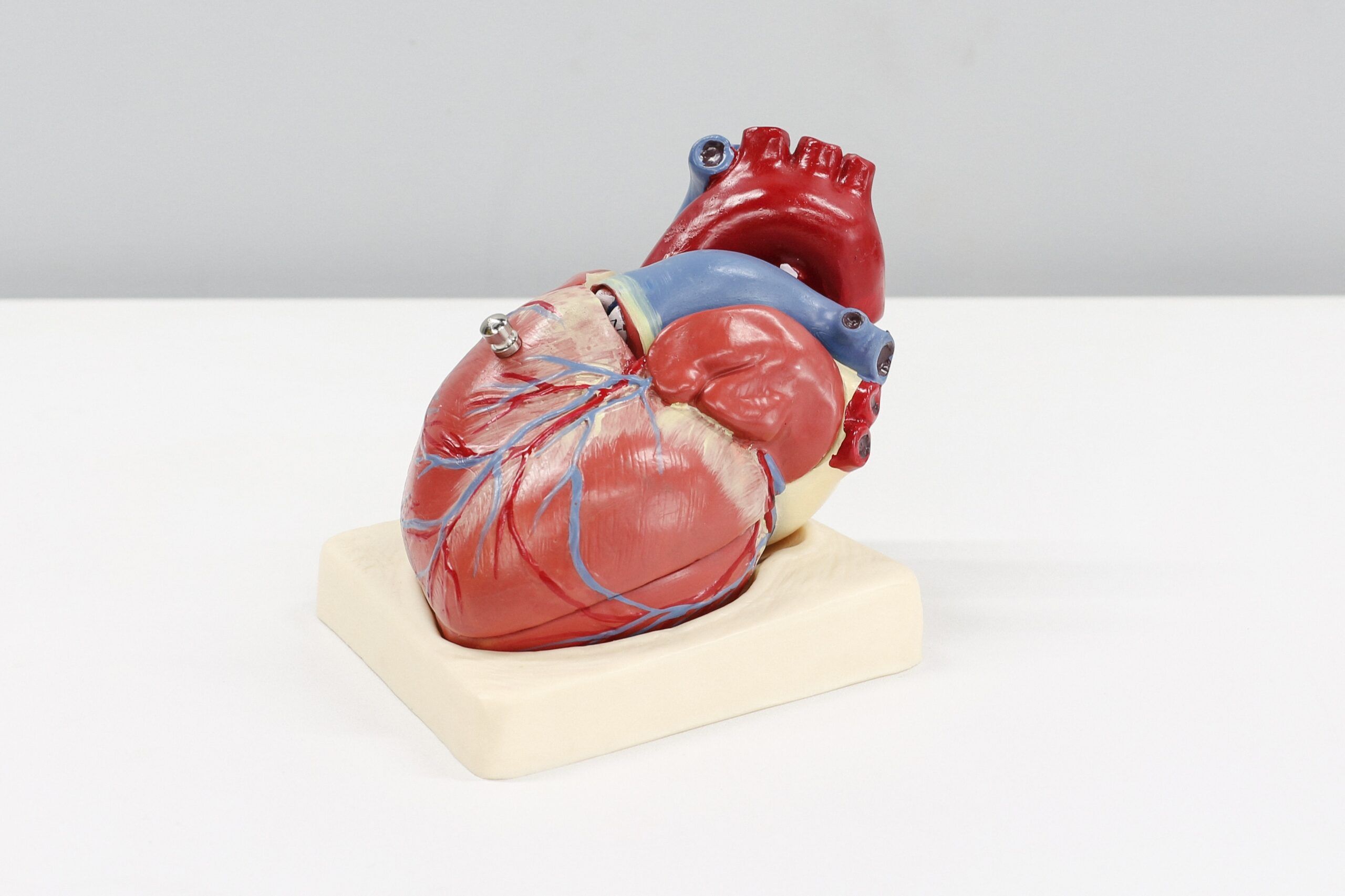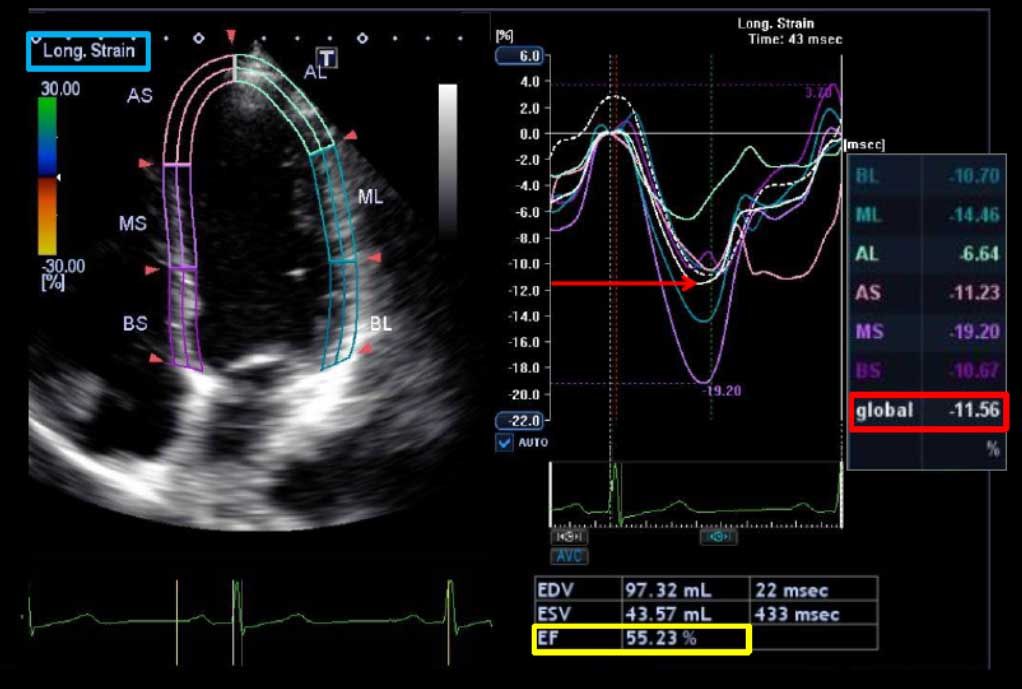Hypertrophic Cardiomyopathy (HCM)
Hypertrophic cardiomyopathy is a condition where the heart muscle becomes thickened. The symptoms that develop depend on the severity of the condition. The treatment depends on the type of symptoms you have and whether complications develop. Some people need no treatment. Most cases are hereditary so screening of close family members is advised.
What happens in hypertrophic cardiomyopathy?
In HCM the heart muscle becomes thickened (hypertrophies) in parts of the heart. In the normal heart, the muscle cells are regular and patterned. In HCM the cells of the heart muscle become irregular and disordered.
The muscle surrounding the left ventricle is the area commonly affected. Sometimes the muscle around the right ventricle is also affected. The degree of thickening may vary in different places. For example, the septum (the wall dividing the right and left ventricle) is often the area with the greatest thickening. In about 1 in 4 people the muscle thickening is evenly distributed throughout the walls of the left ventricle.
The thickened heart muscle usually contracts well to pump blood out of the heart. However, it may lead to problems which include the following:
- The affected heart muscle (usually around the left ventricle) may become stiff. This can mean that your left ventricle may not fill as easily as normal. Less blood than normal is then pumped out from your heart with each heartbeat.
- The thickening is often most marked in the upper part of the septum. This may partly obstruct the flow of blood from your left ventricle into your aorta. This results in less blood being pumped out from your heart.
- The thickened heart muscle may affect the function of your heart valves. In particular, the mitral valve may become leaky if it does not close properly.
- In some people, the abnormal heart muscle affects the electrical conducting system of the heart. This may cause abnormal heart rates and/or rhythms to develop.
What causes hypertrophic cardiomyopathy?
Heart muscle can thicken because of something, such as high blood pressure. In HCM the heart muscle thickens without an obvious cause.
In most cases the condition is inherited. If a couple (where one person has HCM) has a child, there is a 1 in 2 chance of the child being affected. This pattern of inheritance is called autosomal dominant. It seems that affected people inherit defective genes which are involved in making parts of the heart muscle cells.
Men and women are affected equally.
Who develops hypertrophic cardiomyopathy?
It is sometimes present at birth and can develop in young children. However, it most commonly develops in the teenage years or early adulthood.
What are the symptoms of hypertrophic cardiomyopathy?
If you only have mild thickening of the heart muscle you may not have any symptoms. Symptoms can range from mild to severe and may not develop straight away. Possible symptoms include the following:
- Shortness of breath. This may develop only when you exercise if the condition is mild. When the condition is more severe, you can be breathless at rest.
- Chest pain (angina). This may develop only when you exercise, but can also occur at rest when it is more severe. The pain occurs because the supply of blood and oxygen to the heart muscle is not sufficient to meet the demands of the thickened muscle.
- Palpitations. Sometimes abnormalities of heart rhythm (arrhythmias) develop which can cause palpitations. You may become aware that your heartbeat is fast and/or irregular.
- Dizziness and fainting attacks. These occur more commonly when you exercise, but may occur when you are resting. This may be due to reduced output of blood from the heart or because of arrhythmias.
How is hypertrophic cardiomyopathy diagnosed?
A doctor may suspect this condition because of:
- Your symptoms.
- Your family history.
- Changes on your electrocardiogram (ECG) – this is a tracing of the electrical activity of the heart.
- Changes on your chest X-ray. This may show your heart is large or that there is fluid in your lungs.
- Ultrasounds scan of the heart. This is called an echocardiogram. This is a painless test which can measure the thickness of your heart muscle.
Once the diagnosis is confirmed, other tests may be needed to assess the severity of your condition. A Doppler ultrasound scan also looks at blood flow through the heart chambers. This shows how well the heart ventricles are filling and contracting. A Doppler ultrasound scan can also show if there is any turbulent blood flow within the ventricles.
How does the condition progress?
The thickening of the heart muscle does not tend to progress once you stop growing. This means that, for many people, the symptoms remain stable during adulthood. Unfortunately, the symptoms gradually become worse for some people as the heart muscle becomes stiffer. Sometimes the function of the heart gradually deteriorates and heart failure may develop.
Complications may occur and include the following:
Arrhythmias
An arrhythmia is an abnormal rate or rhythm of the heartbeat. There are various types of arrhythmia, some more serious than others. Sometimes an arrhythmia develops intermittently and can cause bouts of palpitations, dizziness and other symptoms. Some arrhythmias become permanent. Arrhythmias can usually be treated.
Endocarditis
This is a rare complication. Endocarditis is an infection of the inside lining of the heart chambers and heart valves. Unless promptly treated, endocarditis can cause serious illness.
People with HCM used to be advised to take antibiotics before dental treatment or other procedures. This is no longer the case, as taking antibiotics has not been shown to reduce the risk of developing infective endocarditis.
Sudden death
Sudden collapse and death occurs in a small number of people with HCM. This is probably due to a severe arrhythmia which may develop suddenly. People most at risk are those with more severe disease, especially those who have had a previous serious arrhythmia. Some people at high risk may be advised on treatments which aim to prevent or treat arrhythmias.
What is the treatment for hypertrophic cardiomyopathy?
There is no treatment which can reverse the changes of the heart muscle. Treatment aims to ease symptoms if they occur and to prevent complications. If you do not have any symptoms or you only have mild symptoms then you may not need any treatment. Treatment which may be required includes the following:
Medication
The medicines advised depend on what symptoms or complications develop. For example:
- Beta-blockers (such as propranolol) and calcium antagonists (especially verapamil) are the commonly used medicines. These can slow the heart rate and make the heart contract less forcefully. This allows more time for the ventricle to fill with each heartbeat. These medicines may be used to treat chest pain, breathlessness and palpitations.
- Various other medicines called anti-arrhythmic medicines (for example, amiodarone) are used to treat and to prevent arrhythmias. They work by interfering with and helping to correct the electrical impulses in your heart.
- Warfarin may be advised if you develop atrial fibrillation (a common arrhythmia). With this arrhythmia a blood clot is a possible complication. Warfarin is an anticoagulant. This means it helps to prevent blood clotting by thinning the blood.
Other types of treatment for arrhythmias
Other treatments may be an option if you develop arrhythmias. For example:
- Cardioversion is an option for some types of arrhythmia. Whilst under anaesthetic, you are given an electric shock over the heart. This may revert the rhythm back to normal.
- Artificial pacemakers are used in certain types of arrhythmia where the heart beats abnormally slowly (complete heart block) and in certain other situations. An artificial pacemaker is a small device which is inserted just under the skin on the upper chest. Wires from the pacemaker are passed through veins into the heart chambers. The pacemaker can then stimulate the heart to maintain a regular normal heartbeat.
- Implantable cardioverter defibrillators (ICDs) are sometimes used in certain situations – especially if you are at risk of developing serious and life-threatening arrhythmias. They are small devices which are similar to pacemakers and are inserted under the skin in the upper chest. Wires are passed through a vein to the heart. The device monitors the heartbeat. If it detects an abnormal rhythm, the device can send a small electrical shock to the heart to change it back to normal.
Surgery
If your cardiomyopathy is severe, an operation may be option:
- Myectomy. This is an operation to remove a segment of thickened muscle from the septum. It is done as open heart surgery. It is not a cure, but can help if the thick septum is causing obstruction to the flow of blood through the aortic valve.
- Alcohol septal ablation. This is a fairly new technique. Alcohol is injected into the small arteries which supply the thickened area of heart muscle. This destroys that part of muscle, which then becomes thinner.
- Valve replacement may be needed if the mitral valve is affected and does not work properly.
- A heart transplant may be needed in a small number of people.
Some other general points
- Family testing (screening). Your first-degree relatives (mother, father, brother, sister, child) should have tests such as a heart tracing and an echocardiogram. Some people with HCM do not have any symptoms. This is why close relatives should be screened. People with HCM have a 1 in 2 chance of passing the condition on to their children. In some centers it may be possible to have a genetic blood test.
- Exercise. Depending on the severity of the condition, some people are advised not to take part in strenuous sports or jobs. Your doctor can advise you about this.
- Weight. Try not to become overweight, which can put an extra strain on your heart.
- Alcohol. Normal social drinking in moderation should not affect your heart. However, too much alcohol can affect the heart muscle and should be avoided.
Source: patient.co.uk


